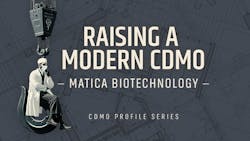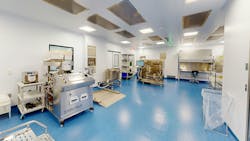Editor's note: This article ran as part of our annual CDMO profiles series, highlighting four young companies built to help pharma tackle the future of medicine.
Matica Biotechnology was conceived as the missing piece of a larger puzzle.
Created to further develop the production capability within the CHA organization — which had long been renowned for its established bio-ecosystem through hospital, academia, research and industry expertise — Matica was strategically established in the heart of Texas, where some of the largest hospital and cancer centers in the U.S. are located, and a large number of clinical trials are conducted.
Recognizing the importance of manufacturing, Matica was spun out as a contract manufacturer poised to address the burgeoning demand for cell and gene therapies (CGTs). Established in December 2019, Matica swiftly actualized its vision by breaking ground on a 25,000-square-foot GMP facility in College Station, Texas.
But Matica was created to bridge another formidable gap: the growing void between the global demand for cell and gene therapies and the industry’s capacity for GMP production.
By leveraging advanced technologies such as real-time monitoring and closed systems, as well as its expert workforce, Matica is helping clients quickly bring CGTs from clinic to patient without compromising on quality.
Engineering excellence
Matica’s manufacturing capabilities are centered around advanced technologies designed to enhance efficiency and productivity.
The company’s commitment to automation and real-time monitoring is highlighted by Brian Greven, senior director of operations, who explains, “One of the things that I’m very proud of is that we’re trying to put automation in at the front end.”
Real-time, in-line readouts provide immediate insights, allowing for reduced production volumes and tighter process control. Early issue detection helps prevent batch failures — as a major hurdle for cell and gene therapy developers — ensuring consistent high-quality outputs. While such failures are costly for all drugmakers, in the realm of cell and gene therapy, a single failed batch can entail financial losses in the millions and pose a risk to patient lives.
Another defining aspect of Matica’s manufacturing capabilities is the implementation of closed systems. Greven underscores the significance of a 100% closed systems, explaining that this approach de-risks processes, reduces adverse events, and enhances efficiency by engineering out potential human error-prone scenarios.
The emphasis on automation extends to the platforming of equipment, with Matica forging an equipment manufacturing collaboration with Sartorius. As Greven points out, “This collaboration extends beyond mere partnerships, as Matica positions itself as an alpha and beta site for Sartorius, actively contributing to the development and testing of newer technologies.”
In its collaboration with Sartorius, Matica is actively engaged in the development and optimization of advanced viral vector manufacturing. Utilizing single-use platforms and automation, they aim to achieve faster, safer and higher-quality production.
In partnership with Texas A&M University’s Center for Innovation in Advanced Development and Manufacturing, Matica is also collaboratively working on the development of innovative manufacturing technology. The goal is to enhance the efficiency of virus-based therapeutics production.
Matica also streamlines operations by utilizing cell lines that yield increased vector outputs and DNA systems that reduce costs and timelines. “Our MatiMax cell lines will support us in overcoming CG&T manufacturing challenges. Every element, encompassing cells, media, equipment, and analytical methodologies, undergoes meticulous fine-tuning to ensure superior performance,” says Greven.
Featuring four proprietary cell lines, the company supports an accelerated development process and heightened productivity for advanced therapies. According to Matica, its HEK293 and HEK293T lines have demonstrated faster doubling times, reduced transfection resource requirements, and shortened overall production timelines.
But developing your own cell lines is not just about making them better — it’s about ensuring availability to manufacture your products. “We’re also developing our own media, which gives us confidence in the reliability of our products,” says Greven.
Fostering workforce culture
Matica believes that the true value of a CDMO is determined by the quality of its people.
Given the broad pharma industry’s persistent workforce shortages, the company takes a multi-pronged approach to nurturing a workforce capable of meeting the demands of the burgeoning CGT industry.
To begin with, Matica looks to foster a symbiotic relationship between leadership and floor-level workers. “Here at Matica, we emphasize that we’re all in this together and that everyone has a crucial part to play in the overall collective success of the company,” says Greven.
The emphasis on worker success is implemented from the first day. At Matica, new employees are tasked with one responsibility during onboarding: getting comfortable. Instead of stressful training and a day full of meetings, employees are instead scheduled to have lunch with their recruiter, followed by a welcome reception by the immediate team. This way, Greven says, people have a chance to celebrate with whomever was responsible for them joining the company and discuss goals and expectations from day one.
Matica’s approach involves looking at the workforce environment in two parts: culture and climate. Climate, as Greven describes it, can be influenced by quickly deploying and demonstrating company values. Culture, on the other hand, becomes the natural result of having everyone feel part of a larger success story.
Take care of the climate, and the culture will follow, “By leading these initiatives, the culture is shaped – evident in town halls, communication methods, and project discussions, not just at executive levels but also on the ground floor,” Greven says.
Charting a course
As Matica charts its course for the future, the company is hoping for organic growth, leveraging its collaborations and cutting-edge technology to maintain its position as an industry leader.
“I foresee that our footprint here in College Station will at least double, if not triple in the next few years,” says Greven.
Partnerships play a pivotal role in Matica’s future plans. “I think that we have some partnerships that are really very fruitful, and we continue to move forward and push the needle,” Greven acknowledges.
The company hopes to sow the seeds of what it has planted locally and use them to grow globally.
“Our approach ensures not only localized impact but also global adaptability. In the event a client decides to transition to another CDMO, though we anticipate they won’t, our methodology is transferable,” says Greven. “Guided by our motto of ‘act locally, but think globally,’ we are attuned to potential project destinations, be it in the U.S., Asia, or Europe, making adaptability and seamless transitions essential.”


